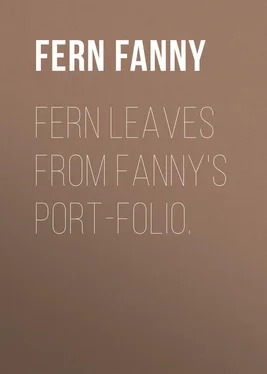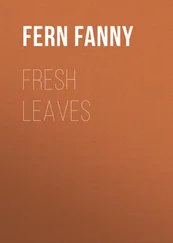Fanny Fern - Fern Leaves from Fanny's Port-folio.
Здесь есть возможность читать онлайн «Fanny Fern - Fern Leaves from Fanny's Port-folio.» — ознакомительный отрывок электронной книги совершенно бесплатно, а после прочтения отрывка купить полную версию. В некоторых случаях можно слушать аудио, скачать через торрент в формате fb2 и присутствует краткое содержание. Издательство: Иностранный паблик, Жанр: foreign_antique, foreign_prose, на английском языке. Описание произведения, (предисловие) а так же отзывы посетителей доступны на портале библиотеки ЛибКат.
- Название:Fern Leaves from Fanny's Port-folio.
- Автор:
- Издательство:Иностранный паблик
- Жанр:
- Год:неизвестен
- ISBN:нет данных
- Рейтинг книги:4 / 5. Голосов: 1
-
Избранное:Добавить в избранное
- Отзывы:
-
Ваша оценка:
- 80
- 1
- 2
- 3
- 4
- 5
Fern Leaves from Fanny's Port-folio.: краткое содержание, описание и аннотация
Предлагаем к чтению аннотацию, описание, краткое содержание или предисловие (зависит от того, что написал сам автор книги «Fern Leaves from Fanny's Port-folio.»). Если вы не нашли необходимую информацию о книге — напишите в комментариях, мы постараемся отыскать её.
Fern Leaves from Fanny's Port-folio. — читать онлайн ознакомительный отрывок
Ниже представлен текст книги, разбитый по страницам. Система сохранения места последней прочитанной страницы, позволяет с удобством читать онлайн бесплатно книгу «Fern Leaves from Fanny's Port-folio.», без необходимости каждый раз заново искать на чём Вы остановились. Поставьте закладку, и сможете в любой момент перейти на страницу, на которой закончили чтение.
Интервал:
Закладка:
How very nice it seemed to sit at the head of that cheerful little table – to make, with my own hands, the fragrant cup of tea – to grow merry with my husband, over crest-fallen Zeb, and poor, stubborn little Bessie, and my uncle’s time-worn bug-bear of a memorandum book!
And how proud I was of him, as he sat there correcting some school-boy’s Greek exercise, while I leaned over his shoulder, looking attentively at his fine face, and at those unintelligible hieroglyphics, and blushing that he was so much wiser than his little Hetty.
This thought sometimes troubled me. I asked myself, will my husband never weary of me? I even grew jealous of his favorite authors, of whom he was so fond. Then I pondered the feasibility of pursuing a course of reading unknown to him, and astonishing him some day with my profound erudition. In pursuance of my plan, I would sit demurely down to some great, wise book; but I saw only my husband’s face looking out at me from every page, and my self-inflicted task was sure to end in some blissful dreamy reverie, with which Cupid had much more to do than Minerva.
CHAPTER VIII
“A proposition, Hetty!” said my husband, throwing aside his coat and hat, and tossing a letter in my lap. “It is from a widow lady, who desires that I should take charge of her little boy, and give him a home in my family, while she goes to the continent, to secure some property lately left her by a foreign relative. It will be advantageous to us, in a pecuniary way, to have him board with us, unless it should increase your cares too much. But, as you are so fond of children, it may, perhaps, after all, prove a pleasant care to you. She is evidently a superior woman. Every line in her letter shows it.”
My husband immediately answered in the affirmative, and the child arrived a week after. He was a fine, intelligent, gentlemanly boy of eight years, with large hazel eyes, and transparently beautiful temples: disinclined to the usual sports of childhood, sensitive, shy, and thoughtful beyond his years – a human dew-drop, which we look to see exhale. He brought with him a letter from his mother, which powerfully affected my husband. During its perusal he drew his hand repeatedly across his eyes, and sat a long while after he had finished reading it, with his eyes closed, in a deep reverie. By-and-by he said, handing me the letter, “there is genius there, Hetty. I never read anything so touchingly beautiful. Mrs. West must be a very talented and superior woman.”
I glanced over the letter. It fully justified my husband’s encomiums. It was a most touching appeal to him to watch with paternal care over her only child; but while she spoke with a mother’s tenderness of his endearing qualities, she wished him taught implicitly, that first of all duties for the young, obedience . Then followed allusions to dark days of sorrow, during which the love of that cherished child, was the only star in her sky.
I folded the letter and sat very still, after my husband left, in my little rocking-chair, thinking. Such a gifted woman as that my husband should have married. One who could have sympathised with him and shared his intellectual pursuits; who would have been something besides a toy to amuse an idle hour, or to minister to his physical necessities. Perhaps it was of this that my husband was thinking, as he sat there with his eyes closed over the open letter. Perhaps he had wed me only from a generous impulse of pity, and that letter had suddenly revealed to him the happiness of which he was capable with a kindred spirit. I was very miserable. I wished the letter had never reached us, or that I had declined the care of the child. Other letters, of course, would come, and the boy would keep alive the interest in the intervals. I wept long and bitterly. At length I was aroused by the entrance of little Charley. A bright flush mounted to his forehead, when he saw my swollen eyes. He hesitated a moment, then gliding up to my side he said, sweetly, “Are you sick? Shall I bathe your head? I used to bathe mamma’s head when it pained her.”
I stood abashed and rebuked in the child’s angel presence, and taking the boy, her boy, in my arms, I kissed him as tenderly as if I had been his mother; while in his own sweet way he told me with childish confidence of his own dead papa; how much he loved mamma; how many, many beautiful things he used to bring her, saying that they were not half good, or half handsome enough for her; how distressed he used to be if she were ill; how carefully he closed the shutters, and tip-toed about the house, with his finger on his lip, telling the servants to close the doors gently; and how he promised him little toys, if he would not disturb mamma’s slumbers; and then, how like diamonds his eyes shone, when she got well; and what beautiful flowers he brought her for her vases; and what a nice, soft-cushioned carriage he brought for her to take the air; and how tenderly he wrapped the shawls about her, and how many charges he gave the coachman, to drive slowly and carefully. And then, how dear papa, at last, grew sick himself; and how mamma watched day and night beside his bed, forgetting to sleep, or eat, or drink; and how nobody dared to tell her that the doctor said he must die; and how papa grew fainter and weaker, and how he said, “Kiss me, Mary, and lay your cheek to mine; I can’t see you.” And then, how mamma fainted and was carried out, and for many, many long days didn’t know even her own little Charley; – and how dreadful it was when she first waked, and tried to remember what had happened; and how nobody could comfort her but Charley; and how he used often to wake up in the night, and find her with a lamp looking at him, because when he was asleep he looked so much like dear, dead papa; and how bitterly she would sob when she was sick, because papa was not there to pity her, and bathe her aching head; and how he (Charley) meant, when he grew up to be a man, to get a nice house for her, and put everything she wanted in it, and make her just as happy as he could.
Well has the Saviour said, “Of such is the kingdom of Heaven.” That night I bent over little Charley’s bed, blessing the little sleeper for his angel teachings, with a heart as calm and peaceful as the mirrored lake, reflecting only the smile of Heaven.
Time passed on. Life became earnest; for a little heart pulsated beneath my own, and a strange, sweet, nameless thrill sent to my chastened lips a trembling prayer. Tiny caps and robes, with many a hope and fear interwoven in their delicate threads, lay awaiting the infant’s advent. I, myself should know the height, and breadth, and depth of a mother’s undying love. What could come between me and this new found treasure?
Meantime letters continued to come from Charley’s mother to her boy, and my husband. It was impossible for me to blind myself to his growing interest in them. On the days they were expected, (for she wrote at regular intervals,) he would be absent and abstracted, or if any delay occurred, almost irritable. When they were received, his eye kindled, his step became elastic, and his whole face grew radiant with happiness.
As the time drew near for the birth of my infant, I grew timid with sad forebodings. I was sitting, one evening at twilight, watching the setting sun, and thinking of the quiet grave it was gilding, where my silver-haired father slept, in the old church yard, when my husband entered. An expression of pain flitted over his features, as he looked at me, and taking my hand, he said, gently, almost tenderly , “You are less well than usual, Hetty; you must not sit here, moping, by yourself.”
I laid my head upon his shoulder with a happiness I had not known for many months. “Listen to me, dear Grey,” said I; “I have a confidence to repose in you that will ease my heart.
Читать дальшеИнтервал:
Закладка:
Похожие книги на «Fern Leaves from Fanny's Port-folio.»
Представляем Вашему вниманию похожие книги на «Fern Leaves from Fanny's Port-folio.» списком для выбора. Мы отобрали схожую по названию и смыслу литературу в надежде предоставить читателям больше вариантов отыскать новые, интересные, ещё непрочитанные произведения.
Обсуждение, отзывы о книге «Fern Leaves from Fanny's Port-folio.» и просто собственные мнения читателей. Оставьте ваши комментарии, напишите, что Вы думаете о произведении, его смысле или главных героях. Укажите что конкретно понравилось, а что нет, и почему Вы так считаете.












